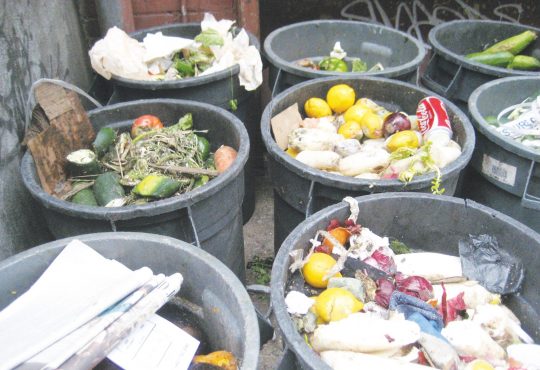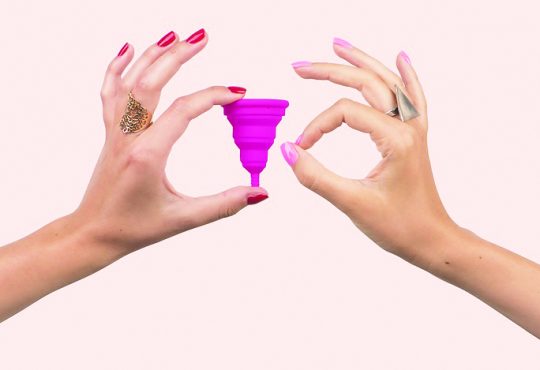Diner encouraged to decrease paper waste: a school that promotes sustainability wastes huge amounts each day
Think of all the waste that could be eliminated if there were no more “to go” containers in the S.U.B.
Everyday at the Diner in the S.U.B., hundreds, if not thousands, of paper plates and cups, plastic utensils, and wrappers are thrown away. Instead of opting for reusable dishes, many students choose disposable tableware that creates an enormous amount of preventable waste.
A “take out” culture, in which even students who eat their food in the Diner often use disposable dishes, thrives on our campus.
According to workers in the Diner that I asked, an estimated half of the dishes used in the S.U.B. are disposable “to go” items. At a school that professes sustainability as a priority, the amount of unnecessary waste generated daily at the S.U.B. is hypocritical.
It is time for the Diner to change its policies to reduce the amount of waste it produces, and for students to actively do their part to show that sustainability truly is an important issue on our campus.
Part of the problem arises from a lack of accessibility. When getting food in the S.U.B., it can be difficult to find ceramic dishes, and disposable paper dishes are often used for lack of alternatives. This is especially true after the lunch and dinner rushes, when all of the dishes are gone and disposables are all that are left.
When someone goes to the drink dispensers, paper cups are the first thing they see; the same is true with paper plates at the salad bar and the breakfast corner.
If someone wants to use a ceramic plate or a reusable plastic cup, they might have to look for one and may even have to go to another station to ask for one.
Other times students have no alternatives to paper plates, such as at the Grill and the Latin American stations, where workers at these stations are told to put hamburgers and taco salads on paper plates and to wrap burritos in plastic wrapping (Isn’t this what tortillas are for?)
There are many ways that the Diner can encourage the use of reusable dishes instead of disposable options.
Firstly, the Diner can follow the example that Diversions and Oppenheimer cafés have set by encouraging customers to use reusable dishes by charging more for disposable “to go” containers and cups, and by prominently displaying information of the environmental impacts of using disposable containers in place of ceramic dishes as part of an awareness-raising program.
In both Diversions and Oppenheimer, there are large “Cup Karma” boards that not only advertise the cafés’ efforts to promote choosing reusable instead of disposable cups, but this program also offers a tangible incentive for customers to use reusable mugs by giving out free drinks.
There are also the very successful Cupless Days at both cafés, in which only reusable cups and mugs are offered. According to the Diversions page on the University’s website, the first Cupless Day alone saved more than 800 paper cups from becoming garbage.
To the credit of the management at the Diner, some steps have been made to reduce waste generated from disposable dishes, including using compostable and recycled containers.
These efforts are surely well intended, but they nonetheless miss the point because they still contribute to excess waste.
Dining employees have told me that only glass and plastic bottles from the tray rack are recycled; everything else is thrown away. And without a composting facility on campus, all of those paper Coke cups we all drink from are also sent to the landfill.
But the problem doesn’t originate solely from the S.U.B.’s policies – students must also be proactive and use reusable dishes when they aren’t getting the food to go.
Students could also choose to eat their food in the S.U.B. more often instead of getting it to go, which would reduce the need for having disposable dishes at all.
Management at the Diner might respond to my critiques by arguing that offering, and sometimes preferring, disposable dishes is a matter of cost, labor, and resources since it may cost less than buying and washing ceramic dishes.
There is also the problem of students depleting the amount of dishes in the Diner every year. To this last point I reply that the answer should be simply to buy more dishes so that, whether it is a matter of physically not having enough dishes in stock or if no dishes are clean, students are not forced to use disposable dishes when there are no others available.
If sustainability really matters to the members of our campus community, then greater resourcefulness and accessibility to reusable dishes and utensils must be displayed at all on-campus eateries. Think of all the waste that could be eliminated if there were no more to go containers.






